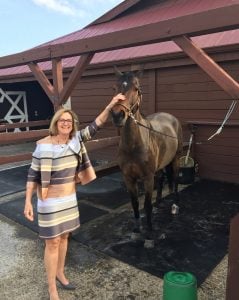In Case of Jumping Horse Dud, Judge Backs Nominal Settlement Offers
West Palm Beach attorney Patricia Leonard says a ruling by U.S. District Judge Kenneth Marra sets "the appropriate standard" for nominal offers of judgment.
October 08, 2018 at 02:27 PM
5 minute read
 Patricia A. Leonard. Courtesy photo
Patricia A. Leonard. Courtesy photo
A ruling in the case of a troubled show horse, a dissatisfied buyer and the particulars of equestrian sports may have implications beyond the federal court where it was issued.
U.S. District Judge Kenneth Marra in West Palm Beach issued a post-verdict order Sept. 25 in Zendejas v. Redman and Syquia denying a plaintiff's motion for judgment as a matter of law and alternative motion for a new trial while granting defense motions for entitlement to attorney fees and costs.
In August 2017, a federal jury ruled against Mexican businessman Alejandro Zendejas in his lawsuit against Wellington horse trainer Eugenie Redman and horse broker Colin Syquia. Zendejas sued Redman and Syquia after growing frustrated after buying a jumper named Vorst for $250,000.
Zendejas filed a 12-count complaint claiming breach of contract, fraud and negligent misrepresentation, claiming Vorst was a “dirty stopper” — a horse that reels back at obstacles.
Although a federal jury cleared Redman and Syquia of all claims and awarded no damages to end a two-week trial, a dispute over attorney fees continued.
Before discovery, Syquia served Zendejas with a proposed settlement of $500. Zendejas declined, then passed on a proposed settlement of $5,000. In response to defense motions for fees following the jury verdict, Zendejas' counsel contended that because the offers of judgment were for “nominal” sums and well below the $1 million in damages Zendejas sought, they could not possibly have been made in good faith.
If a proposed settlement is deemed in bad faith, it is one of the few exceptions from entitlement to attorney fees.
Besides granting the defense motions for fees in his order, Marra also articulated a standard for determining when nominal offers have been made in good faith.
Read Marra's order on nominal offers of judgment:
Redman and Syquia's “offers were based upon a reasonable evaluation of potential liability and damages, and, as indicated in the case law, the nominal nature of the offers is not sufficient to show bad faith,” Marra wrote. “The correct standard under Florida law is whether the offerors had 'a reasonable basis at the time of the offer to conclude that their exposure [to liability] was nominal.' ”
Shutts & Bowen partner Patricia A. Leonard, who represented Syquia, told the Daily Business Review that Marra's order set “an appropriate standard with regard to nominal offers of judgment.”
“This order is going to be very useful to litigants on nominal offers of judgment,” Leonard said. “The court made clear that the correct standard is whether the offer had a reasonable foundation based on the facts and circumstances that were known at the time of the offer.”
Leonard also noted Marra's order noted there is no requirement for a sworn affidavit to explain the reasoning behind a settlement proposal.
“Just because an offer is low in comparison with the amount of damages sought does not mean that it was not made in good faith; that's not correct,” Leonard said. “The order also says the fact that the plaintiff may have been unlikely to accept the offer does mean it was not made in good faith.”
Leonard's enthusiasm for the order is shared by Carlton Fields attorney Sarah Cortvriend, who represented Redman. He was “very pleased” with Marra's “very thorough” order. ”It comports with Florida law but maybe adds a few things that haven't been articulated in one place before,” Cortvriend said.
 Attorney Sarah Cortvriend with Vorst, the horse at the center of the legal dispute.
Attorney Sarah Cortvriend with Vorst, the horse at the center of the legal dispute.John R. Hart, who also represented Redman, said plaintiffs made their ”reasonable offer” to Zendejas based on their interpretation of the facts at hand.
“Once the case was filed and we had completed initial investigation … we didn't believe it was well-founded,” Hart said. “We sent an offer of $5,000 so we could end this and not spend the extensive amount that was spent.”
Even with the latest order, Cortvriend and Hart emphasized their client is still upset about the circumstances. Hart told the DBR that Vorst “was really belittled by Mr. Zendejas in court,” something that disturbed his client a great deal.
“Ms. Redman loves horses, she has a long history with them, and she treats them really well,” Cortvriend said. She added her client “really felt like she needed to defend the honor of the horse” and maintained Vorst's dirty-stopper condition was due to injuries suffered after the purchase.
Zendejas' lawyer, Los Angeles equine attorney David Yoshida, told the DBR that he and his client's legal team believe Marra's reasoning “was consistent with the law” but are nonetheless disappointed with the outcome.
“We do intend on appealing his decisions. We have retained a certified appellate specialist,” Yoshida said. Fort Lauderdale appellate attorney Donna Solomon, who has been hired, declined to comment.
Yoshida described his client and co-counsel as “optimistic” about their chances on appeal.
“We strongly believe in our client's position, and we do believe he was defrauded,” Yoshida said. “We're hoping with this case to signal to the horse world that it's not OK to be misleading in horse deals. We weren't able to prevail in this matter and send that signal out loud and clear, but we're hoping that time will change that.”
Related stories:
Sale of Show Horse That Wouldn't Jump Was Valid
Palm Beach County attorneys rate judges
Appellate Court Issues Ruling on Attorney Fees by Way of Rejected Offers of Judgment
This content has been archived. It is available through our partners, LexisNexis® and Bloomberg Law.
To view this content, please continue to their sites.
Not a Lexis Subscriber?
Subscribe Now
Not a Bloomberg Law Subscriber?
Subscribe Now
NOT FOR REPRINT
© 2025 ALM Global, LLC, All Rights Reserved. Request academic re-use from www.copyright.com. All other uses, submit a request to [email protected]. For more information visit Asset & Logo Licensing.
You Might Like
View All
Plaintiffs Attorneys Awarded $113K on $1 Judgment in Noise Ordinance Dispute
4 minute read
US Judge Cannon Blocks DOJ From Releasing Final Report in Trump Documents Probe
3 minute read

Read the Document: DOJ Releases Ex-Special Counsel's Report Explaining Trump Prosecutions
3 minute readTrending Stories
Who Got The Work
J. Brugh Lower of Gibbons has entered an appearance for industrial equipment supplier Devco Corporation in a pending trademark infringement lawsuit. The suit, accusing the defendant of selling knock-off Graco products, was filed Dec. 18 in New Jersey District Court by Rivkin Radler on behalf of Graco Inc. and Graco Minnesota. The case, assigned to U.S. District Judge Zahid N. Quraishi, is 3:24-cv-11294, Graco Inc. et al v. Devco Corporation.
Who Got The Work
Rebecca Maller-Stein and Kent A. Yalowitz of Arnold & Porter Kaye Scholer have entered their appearances for Hanaco Venture Capital and its executives, Lior Prosor and David Frankel, in a pending securities lawsuit. The action, filed on Dec. 24 in New York Southern District Court by Zell, Aron & Co. on behalf of Goldeneye Advisors, accuses the defendants of negligently and fraudulently managing the plaintiff's $1 million investment. The case, assigned to U.S. District Judge Vernon S. Broderick, is 1:24-cv-09918, Goldeneye Advisors, LLC v. Hanaco Venture Capital, Ltd. et al.
Who Got The Work
Attorneys from A&O Shearman has stepped in as defense counsel for Toronto-Dominion Bank and other defendants in a pending securities class action. The suit, filed Dec. 11 in New York Southern District Court by Bleichmar Fonti & Auld, accuses the defendants of concealing the bank's 'pervasive' deficiencies in regards to its compliance with the Bank Secrecy Act and the quality of its anti-money laundering controls. The case, assigned to U.S. District Judge Arun Subramanian, is 1:24-cv-09445, Gonzalez v. The Toronto-Dominion Bank et al.
Who Got The Work
Crown Castle International, a Pennsylvania company providing shared communications infrastructure, has turned to Luke D. Wolf of Gordon Rees Scully Mansukhani to fend off a pending breach-of-contract lawsuit. The court action, filed Nov. 25 in Michigan Eastern District Court by Hooper Hathaway PC on behalf of The Town Residences LLC, accuses Crown Castle of failing to transfer approximately $30,000 in utility payments from T-Mobile in breach of a roof-top lease and assignment agreement. The case, assigned to U.S. District Judge Susan K. Declercq, is 2:24-cv-13131, The Town Residences LLC v. T-Mobile US, Inc. et al.
Who Got The Work
Wilfred P. Coronato and Daniel M. Schwartz of McCarter & English have stepped in as defense counsel to Electrolux Home Products Inc. in a pending product liability lawsuit. The court action, filed Nov. 26 in New York Eastern District Court by Poulos Lopiccolo PC and Nagel Rice LLP on behalf of David Stern, alleges that the defendant's refrigerators’ drawers and shelving repeatedly break and fall apart within months after purchase. The case, assigned to U.S. District Judge Joan M. Azrack, is 2:24-cv-08204, Stern v. Electrolux Home Products, Inc.
Featured Firms
Law Offices of Gary Martin Hays & Associates, P.C.
(470) 294-1674
Law Offices of Mark E. Salomone
(857) 444-6468
Smith & Hassler
(713) 739-1250






